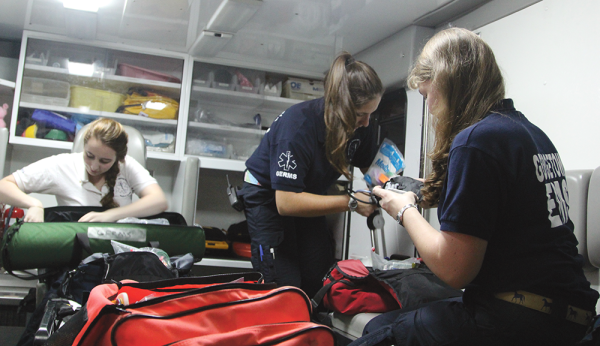The Georgetown Emergency Response Medical Service will only operate on weekend nights and will not accept new members for the fall 2021 semester because of various complications related to COVID-19.
The on-campus volunteer, student-run emergency medical service announced Aug. 21 that it will only operate from 8 p.m. to 8 a.m. on Fridays and Saturdays, instead of its usual 24-hour service. Additionally, GERMS announced in a separate post that it is not hiring new members during the fall 2021 semester.
Both changes result from a lack of training for current members during the COVID-19 pandemic, according to Ashley Rensted (COL ’22), GERMS’ vice president of staff.
“GERMS’s structure is dependent on having members who are qualified to serve as drivers and crew leaders, and both of these positions require comprehensive internal training processes,” Rensted wrote in an email to The Hoya.
GERMS responds to student illnesses, injuries and intoxication as well as medical issues for any community members in the surrounding West Georgetown, Burleith and Foxhall neighborhoods.
Training for members includes a combination of review sessions and realistic simulations to ensure members know how to respond to a variety of situations, according to Rensted. Current GERMS members continued their required education to maintain standing as certified EMTs throughout the pandemic, even while GERMS was out of service.
“Attending these training sessions is mandatory for our members to maintain good standing in the organization, and continuing education as a whole is an integral part of GERMS as an institution,” Rensted wrote.

Although GERMS did not operate between March 2020 and June 2021 because of the pandemic, it hired 11 new members during the pandemic who will begin full-time service after completing training this fall. The addition of these members adds to GERMS’ inability to accept new members this fall, according to Rensted.
Because of the decrease in service hours, students who call GERMS outside of its operating hours will automatically be forwarded to the Georgetown University Police Department. GUPD will then dispatch D.C. Fire and EMS services, according to Faith Kean (COL ’22), a current member of GERMS.
While GERMS has fewer operating hours, students will still have access to FEMS and GUPD in case of emergencies, according to a university spokesperson.
“We expect GERMS to be able to recover to pre-pandemic staffing levels and regular service as soon as training and certification requirements allow,” the university spokesperson wrote.
FEMS services will uphold GERMS’ medical amnesty policy for students, according to FEMS Director of Communications Jennifer Donelan. The policy ensures that students receiving GERMS treatment face no disciplinary consequences from the university for underage drinking or drug use that results in medical treatment.
“We abide by all existing medical privacy laws for all patients we serve,” Donelan wrote in an email to The Hoya. “We do not report alcohol consumption other than to hospital staff when medically necessary for treatment by a physician.”
However, while GERMS typically receives two to three calls per weekday and four to five calls on weekend nights, FEMS typically receives over 400 calls a day.
Further, GERMS ambulance transportation is free for students, but FEMS charges between $428 and $735 for its services. Transportation and care costs will apply to Georgetown students who use the service, according to Donelan.
“As far as billing for medical transport, our procedures are the same for any citizen or visitor to the District of Columbia who utilizes our service,” Donelan wrote.
For students like Allegra Lubar (COL ’23), the fact that FEMS may not be able to respond to student emergencies as quickly as GERMS is concerning.
“I don’t think we should take them for granted, but I do think that their limited hours makes Georgetown less safe,” Lubar wrote in an email to The Hoya.
GERMS leaders are working hard to return the organization to its normal operating schedule by focusing on training current members for crew leader and driver positions, according to Rensted.
“We recognize the importance of GERMS being a resource available for our campus community 24/7, so we are putting lots of energy and time into promoting current members into these positions so that we can expand our hours,” Rensted wrote.
Despite this semester’s changes, GERMS is still confident it can assist the Georgetown community, according to Kean.
“We are maintaining a high quality of care with limited operating hours and are still effective and efficient given the limited resources we have,” Kean wrote in a statement to The Hoya.





















